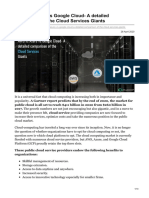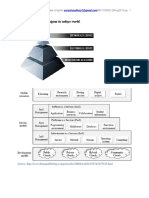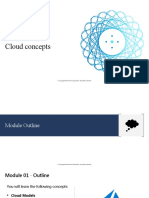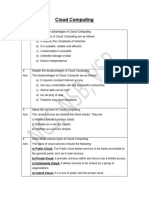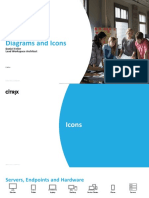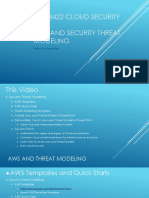DS-6223, Cloud Computing
Presented by:
Dr. Atta Ur Rahman
1
� Table of Contents
❖ Introduction
❖ Cloud service providers
❖ AWS Vs Azure Vs Google Cloud
❖ Comparison
❖ Computing
❖ Storage
❖ Examples
2
� Overview of cloud providers
❖ Major cloud service providers:
❖ AWS (Amazon Web Services)
Owner: Amazon.com
Launch Year: 2006
❖ Azure (Microsoft Azure)
Owner: Microsoft
Launch Year: 2010
❖ Google Cloud Platform (GCP)
Owner: Google
Launch Year: 2011
3
� AWS
❖ AWS offers a wide range of cloud services, from basic hosting and
deployment to analytics, blockchain, machine learning, and more.
❖ All the storage and computing resources come from a distributed network
of data centers spread across the globe, to facilitate less latency and a
better experience for your end-users.
❖ AWS offers a hosting and storage service called Amazon Simple Storage
Service, more commonly known as Amazon S3, as well as elastic block
storage, and more.
❖ AWS Currently Has a 6% Market Share in Web Hosting.
4
� AWS
❖ AWS is the hosting service provider of choice for a lot of global
enterprises and well-known companies, including Netflix (world's
leading streaming platforms), Airbnb (the popular online marketplace
for lodging) etc.
❖ Because of data-intensive video, Netflix alone uses over 100,000 server
instances for its storage and computing needs. Many leading companies use
AWS to host their websites and data.
❖ Samsung, the multinational conglomerate, chose AWS to support its global
expansion. AWS's global presence allows Samsung to deliver its services with
low latency and high availability to customers worldwide.
5
� AWS Market Share
❖ AWS has historically been the leader in the cloud market, with a
significant market share.
❖ AWS was one of the earliest entrants into the cloud computing market.
This early start allowed AWS to establish a strong foothold in the
industry.
❖ With 34% market share among cloud hosting providers in the top 100k,
Amazon owns the bigger piece of the visible internet out of the big
three.
6
� AWS Security
❖ AWS invests heavily in security and compliance, offering a range of tools
and certifications to help customers meet their security and compliance
requirements.
❖ AWS's security features, such as AWS Identity and Access Management
(IAM) and AWS Key Management Service (KMS), assist Capital One in
safeguarding sensitive financial data.
❖ Virtual Private Cloud (VPC) is a logically isolated section of the AWS
cloud where you can launch AWS resources. It provides network-level
security controls and allows you to define your own network topology.
7
� Google Cloud
❖ Google Cloud Platform (GCP) is a suite of cloud computing services and
products offered by Google. It provides a wide range of cloud-based
infrastructure, platform, and software services that can be used to
build, deploy, and scale applications, as well as store and analyze data.
❖ Infrastructure Services (IaaS):
• Compute Engine: This is Google's Infrastructure as a Service (IaaS) offering,
providing scalable virtual machines (VMs) that can be used to run various
workloads. Users can choose from various machine types and configurations
based on their needs.
• Example; Website Hosting: We can create a scalable and reliable web
hosting environment by deploying web servers on Compute Engine VMs.
8
� Google Cloud
❖ App Engine: Google's Platform as a Service (PaaS) offering, designed for
building and deploying web applications. It abstracts away much of the
infrastructure management, allowing developers to focus on coding.
❖ Examples;
❖ Content Management Systems (CMS): Developers can build content
management systems for websites and web applications using App
Engine. The platform's scalability ensures that even high-traffic
websites can be managed efficiently.
❖ E-commerce Platforms: Building e-commerce platforms and online
stores is another common use case for App Engine. You can create
scalable and secure online shopping experiences with ease.
9
� Google Cloud
❖ We can use GCP's infrastructure and services to create,
deliver, and manage Software as a Service (SaaS) offerings.
❖ Compute Engine: We can create and manage virtual
machines (VMs) to host our SaaS application. These VMs
can run our application's code and serve as the backend
infrastructure.
❖ We can set up VM instances to run our web server
software, application code, and database servers. For
instance, we can use Apache for the web server and set up
a backend framework like Node.js, Django, etc.
10
� Google Market Share
❖ Google Cloud nearly doubled its market share between 2017-2022,
from 6% to 12%.
❖ Google dropped from 5th place to position 13, with 1.9% after
unexpectedly selling its domain-hosting business to Squarespace.
❖ Google is at the forefront of AI and machine learning technologies, and
GCP offers a wide array of AI/ML tools, allowing businesses to develop
and deploy machine learning models efficiently.
❖ Examples
❖ Snap Inc. (Snapchat): Snap relies on GCP to handle the storage and
processing of its vast collection of multimedia content.
11
� Microsoft Azure
❖ Azure is one of the major cloud providers and competes with AWS.
❖ Key Services: Azure provides services similar to AWS, including virtual
machines (VMs), Azure Storage, Azure SQL Database, Networking,
AI/ML, and DevOps.
❖ Example: Microsoft products such as Windows Server, Active Directory,
and Office 365.
❖ Use Cases: Azure is often chosen by organizations already using
Microsoft technologies for seamless integration and hybrid cloud
solutions.
❖ Azure DevOps is a set of development tools that support the entire
software development lifecycle (SDLC), including planning, coding,
testing, and deployment.
12
� Microsoft Azure
❖ Microsoft charges for Azure on a pay-as-you-go (PAYG) basis,
meaning subscribers receive a bill each month that only charges
them for the specific resources and services they have used.
❖ Microsoft provides five different customer support options for Azure:
Basic, Developer, Standard, Professional Direct, and Enterprise
(Premier).
❖ Basic support is available to all Azure accounts, but Microsoft charges a
fee for the other support offerings. Developer support costs $29 per
month, while Standard support costs $100 per month and Professional
Direct support is $1,000 per month. Microsoft does not disclose the
pricing for Enterprise support.
13
� Market Share
❖ Microsoft Azure clocks in at just 8% Market share.
❖ Microsoft is the clear straggler at just 1.2% market share of commercial
and private web hosting combined.
❖ Microsoft Azure is not just limited to providing cloud services, but they
are also into Blockchain with the name Azure Blockchain Workbench
and has a market share of about 5.07% of the total blockchain market.
14
�Market Share
15
� AWS Vs Azure Vs Google Cloud
❖ Picking the right cloud platform can be a pivotal decision that
shapes the future of your organization’s digital journey.
❖ Each offers a treasure trove of features, services, and
capabilities, making the decision akin to selecting the perfect
tool for a master craftsman.
16
�AWS Vs Azure Vs Google Cloud
17
� AWS Vs Azure Vs Google Cloud
Cloud Service Computing
AWS EC2 (Elastic Compute Cloud) provides all the
computing administration. The program oversees
virtual machines, which can either be designed by
the owner or have pre-configured settings for
convenience
Azure With Microsoft Azure, you can create virtual
machines and scale sets for virtual machines.
Google Cloud As part of GCP (Google Cloud Platform), GCE
(Google Compute Engine) does a similar function.
18
� AWS Vs Azure Vs Google Cloud
Cloud Service Storage
AWS AWS provides apportioned, transient (brief)
stockpiling. As soon as an instance begins, it is
demolished at the end of the case.
Azure Azure uses ID drives (transient capacity), and Page
Blobs VM-based volumes are stored in Block Storage
(Microsoft's choice). Object Storage uses Square
Blobs and Files.
Google Cloud Comparatively, Google's Cloud Platform offers both
brief stockpiling and constant circles. For Object
stockpiling, GCP has Google Cloud Storage.
19
� AWS Vs Azure Vs Google Cloud
❖ AWS: AWS offers Elastic Compute Cloud (EC2) instances, providing a
wide variety of virtual machines optimized for different use cases.
AWS also has serverless computing with AWS Lambda, which allows
you to run code without provisioning or managing servers.
❖ Azure: Azure provides Virtual Machines (VMs) similar to AWS. Azure
Functions is its serverless computing service. Azure also offers Azure
App Service for building and hosting web applications.
❖ GCP: GCP has Compute Engine for VMs and Cloud Functions for
serverless computing. Google Kubernetes Engine (GKE) is a strong
offering for container orchestration.
20
� AWS Vs Azure Vs Google Cloud
❖ Example: If you want to host a web application, Azure's Azure App
Service might be more developer-friendly, while AWS's EC2 provides
fine-grained control over VM configurations.
❖ Database Services:
❖ AWS: AWS offers Amazon RDS (Relational Database Service),
Amazon DynamoDB (NoSQL), and Amazon Redshift (data
warehousing).
❖ Azure: Azure provides Azure SQL Database, Cosmos DB (NoSQL), and
Azure Synapse Analytics (data warehousing).
❖ GCP: GCP includes Cloud SQL (relational databases), Firestore
(NoSQL), and BigQuery (data warehousing and analytics).
21
� AWS Vs Azure Vs Google Cloud
❖ Example: If you need a high-performance NoSQL
database for a web application, Azure's Cosmos DB offers
low-latency global distribution.
❖ For big data analytics, Google's BigQuery is renowned for
its speed and scalability.
22
� AWS Vs Azure Vs Google Cloud
❖ AI and Machine Learning:
❖ AWS: AWS offers Amazon SageMaker for machine learning and a
wide range of AI services like Amazon Rekognition and Comprehend.
❖ Azure: Azure has Azure Machine Learning and Cognitive Services,
including services for vision, speech, and language understanding.
❖ GCP: GCP's AI and ML offerings include Cloud Machine Learning
Engine, Vision AI, and Natural Language Processing.
❖ Example: If you want to build a recommendation system, AWS's
SageMaker can help you build and train your models. If you need to
implement sentiment analysis in your application, Azure's Cognitive
Services provides pre-built models for that.
23
� AWS Vs Azure Vs Google Cloud
❖ Serverless Computing:
❖ AWS: AWS Lambda is a serverless computing platform that allows
you to run code in response to events without provisioning or
managing servers.
❖ Azure: Azure Functions is Microsoft's serverless compute service for
event-driven applications.
❖ GCP: Google Cloud Functions is GCP's serverless offering for building
and deploying functions in response to events.
❖ Example: If you want to create an automated process to resize and
store images in response to user uploads, AWS Lambda can be a
strong choice.
24
� AWS Vs Azure Vs Google Cloud
❖ Serverless Computing:
❖ AWS: AWS Lambda is a serverless computing platform that allows
you to run code in response to events without provisioning or
managing servers.
❖ Azure: Azure Functions is Microsoft's serverless compute service for
event-driven applications.
❖ GCP: Google Cloud Functions is GCP's serverless offering for building
and deploying functions in response to events.
❖ Example: If you want to create an automated process to resize and
store images in response to user uploads, AWS Lambda can be a
strong choice.
25
� AWS Vs Azure Vs Google Cloud
❖ Hybrid and Multi-Cloud:
❖ AWS: AWS Outposts brings AWS infrastructure to your on-premises
data center. AWS also supports hybrid cloud deployments through
Direct Connect.
❖ Azure: Azure Arc allows you to manage resources in your data
center and other cloud providers, while Azure Stack extends Azure
services to your data center.
❖ GCP: GCP's Anthos allows for hybrid and multi-cloud management,
including managing workloads on other cloud providers.
❖ Example: If you have a legacy application in your on-premises data
center that you want to connect with cloud resources, Azure Arc or
AWS Outposts could be suitable, depending on your cloud provider.
26
� AWS Vs Azure Vs Google Cloud
❖ AWS Outposts is a family of fully managed solutions delivering AWS
infrastructure and services to virtually any on-premises or edge
location for a truly consistent hybrid experience.
❖ Azure Arc is a bridge that extends the Azure platform to help you
build applications and services with the flexibility to run across
datacenters, at the edge, and in multicloud environments.
❖ Google Cloud Anthos is a hybrid, cloud-agnostic container
environment. Google Cloud Anthos is a software product that
enables enterprises to use container clusters instead of cloud virtual
machines (VMs) to bridge gaps between legacy software and cloud
hardware.
27
�Thank You!
Any Question
28























































